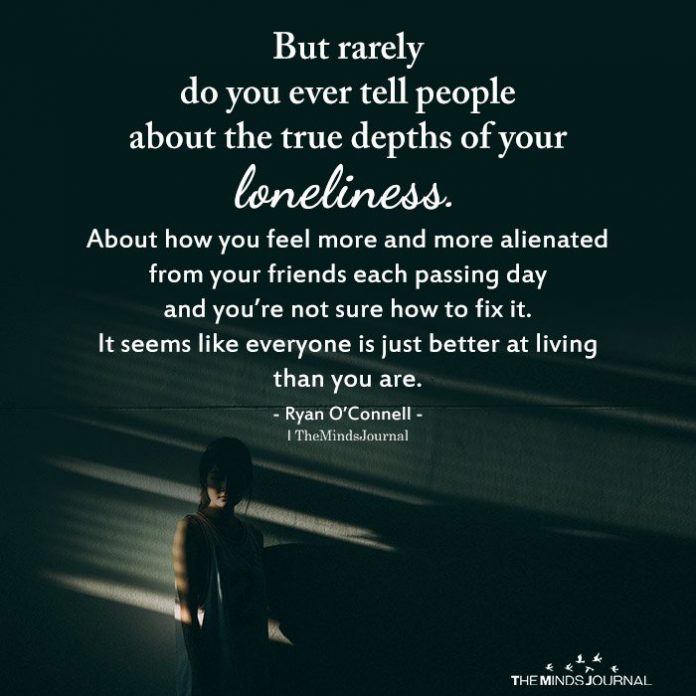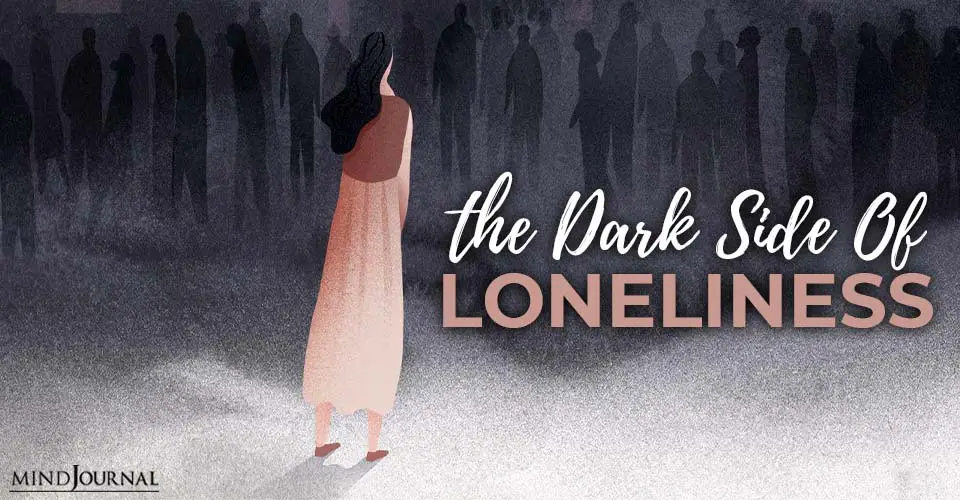Wanting to be alone at times, and enjoying solitude is a good thing when it comes to self-awareness and self-development. But what about loneliness? Solitude and loneliness are not always the same thing, and sometimes the dark side of loneliness can emerge and take a mental toll on you.
Many people, especially codependents, are haunted by inner loneliness. Twenty percent (60 million) of Americans report that loneliness is the source of their suffering. In fact, our emotional reaction to rejection emanates from the area of our brain (the dorsal anterior cingulated) that also responds to physical pain. (Cacioppo and Patrick, 2008)
Loneliness is associated with living alone, which surveys indicate has steadily risen to 27 percent in 2013 and to 50 percent and higher in parts of Florida, West Virginia, and especially California. However, being alone only describes a physical condition.
We don’t always feel lonely when we’re alone. Individual needs for connection vary. Some people choose to live solo and are happier doing so. They don’t suffer the same sense of abandonment caused by the unwanted loss of a partner through a break-up, divorce, or death. They may also have greater inherited insensitivity to social disconnection, according to recent research.
Loneliness In Relationships
Although loneliness is greater among people living alone, it can be felt while in a relationship or group. This is because it’s the quality, not the quantity, of social interactions that determines whether we feel connected. As the number of work hours and household television sets has increased, family dinners have declined.
Today, although the quantity of interactions has increased, due to the proliferation of cell phones, screen time is replacing face time. People spend more time on their digital devices than in face-to-face conversations, contributing to more loneliness. (Cacioppo, 2012) A UCLA study shows that social skills are declining as a result.
There’s a 40 percent decline in empathy among college students due to new technology, and 12-year olds are socially behaving like 8-year-olds. (Turkle, 2015) Recently, Pew Research Center found that 82 percent of adults felt that the way they used their phones in social settings hurt the conversation.
Related: Managing Loneliness and Heartbreak
Codependency And Lack Of Intimacy
The absence of someone nurturing to listen, care and affirm our existence makes us feel isolated or emotionally abandoned. Although intimate connections are the remedy, characteristically, codependent relationships lack intimacy. Codependents have difficulty with intimacy due to shame and poor communication skills. Often they partner with someone addicted, abusive, or just emotionally unavailable (and they may be, as well.)
Whether alone or in a relationship, codependents may be unable to identify the source of their unhappiness, feeling depressed, sad, or bored, yet not knowing that they’re lonely. Others know, but find it difficult to effectively ask for their needs. Their relationship dynamics and loneliness may seem familiar, like the emotional dysfunction in their childhood.
We want and need emotional closeness from our partner and friends, but when an intimate, emotional bond is lacking, we experience disconnection and emptiness. (For more on emptiness and healing, see Chapter 4, “There’s a Hole in My Bucket” in Conquering Shame and Codependency.)
Years ago, I believed that more shared activities would create that missing connection, not realizing it was something less tangible–real intimacy, which was absent in my relationship. Instead, like most codependents, I experienced “pseudo-intimacy,” which can take the form of a romantic “fantasy bond,” shared activities, intense sexuality, or a relationship where only one partner is vulnerable, while the other acts as an advisor, confidant, provider, or emotional caretaker.
The undercurrent of loneliness and fear of loneliness stems from a chronic lack of connectedness and loneliness in childhood. While some children are neglected or abused, the majority grow up in families where parents don’t have the time or sufficient emotional resources to honor their children’s feelings and needs.
Children feel ignored, unloved, shamed, or alone. Some feel like an outsider, that “No one gets me,” even though their family otherwise appears to be normal. To cope, they withdraw, accommodate, rebel, and/or take up addictions, and mask, and eventually deny, what they feel inside.
Related : Your Biggest Intimacy Issue Based On Your Zodiac Sign
Loneliness And Shame
Meanwhile, children’s growing sense of separation from themselves and lack of authentic connection with a parent(s) can breed inner loneliness and feelings of unworthiness. “The awareness of human separation, without reunion by love–is a source of shame. It is at the same time the source of guilt and anxiety.” (Fromm, E., The Art of Loving, p. 9)
As adults, codependents can get caught in a self-defeating cycle of loneliness, shame, and depression. Repeated break-ups and abandoning relationships can foster a worsening cycle of abandonment. (See “Breaking the Cycle of Abandonment.”)
The greater is our loneliness, the less we seek to engage with others, while our anxiety around authentic connection grows. Studies show that prolonged loneliness breeds low self-esteem, introversion, pessimism, disagreeableness, anger, shyness, anxiety, lessened social skills, and neuroticism.
We imagine negative evaluations from others, called shame anxiety. This leads to anxious, negative, and self-protective behaviors, to which other people respond negatively, fulfilling our imagined outcome.
The shame associated with loneliness is directed not only against ourselves. Loneliness carries a stigma–so we don’t admit we’re lonely–but is also experienced by others with gender differences. Lonely men are perceived more negatively than women, and more negatively by women, even though more women than men report feeling lonely. (Lau, 1992)
Related: How To Be Single Without Being Lonely
Health Risks
The strong association between loneliness and depression is well documented; but, loneliness also triggers serious health risks, impacting our endocrine, immune, and cardiovascular systems, and accelerating death.
According to a recent study, loneliness has an increased risk for cancer, neurodegenerative disease, and viral infections. Perceived loneliness triggers a flight-or-fight stress response. Stress hormones and inflammation rise, and exercise and restorative sleep decrease. Norepinephrine surges, shutting down immune functions and ramping up the production of white blood cells that cause inflammation. Meanwhile, it makes us less sensitive to cortisol that protects us from inflammation.
In commenting on the research, neuroscientist Turhan Canli points out that loneliness one year affects our genetic inflammatory response the following year, confirming the self-reinforcing, negative, emotional spiral discussed above: “Loneliness predicted biological changes, and biological changes predicted changes in loneliness.” (Chen, 2015)

Coping With Loneliness
For many of us, when we’re lonely, we tend to isolate even more. We may not feel like talking to someone, even though it would help. Now we have the data to explain why biological, even genetic changes make loneliness hard to overcome. We may turn to addictive behavior instead of seeking social connection. There is a high correlation between obesity and loneliness.
We really have to fight our natural instinct to withdraw. Try admitting to a friend or neighbor that you’re lonely. To motivate socializing with other people, commit to a class, meet-up, CoDA, or another 12-Step meeting. Exercise with a buddy. Volunteer or support a friend in need to take your mind off of yourself and lift your spirits.
As with all feelings, loneliness is worsened by resistance and self-judgment. We fear experiencing more pain if we allow our hearts to open. Often, the reverse is true. Allowing feelings to flow can not only release them but also the energy expended in suppressing them. Our emotional state shifts, so that we feel invigorated, peaceful, tired, or content in our aloneness.
For more suggestions, read “Coping with Loneliness” in Codependency for Dummies.
©Darlene Lancer 2018
John T. Cacioppo, Stephanie Cacioppo, “The Phenotype of Loneliness” European Journal of Developmental Psychology, 2012 Jul 1; 9(4): 446–452. John T. Cacioppo and William Patrick, “Loneliness: Human Nature and the Need for Social Connection,” The Wall Street Journal, Nov. 28, 2008. Angus Chen, “Loneliness May Warp Our Genes, And Our Immune Systems,” NPR, Your Health, November 29, 2015. Lau, S., & Gruen, G. E. (1992). “The social stigma of loneliness: Effect of target person’s and perceiver’s sex.” Personality & Social Psychology Bulletin, 18, 182-189. Turkle, Sherry, “Stop Googling. Let’s Talk,” The New York Times, Sept. 26, 2015.
Written by Darlene Lancer JD, MFT Originally appeared on WhatIsCodependency.com










Leave a Reply
You must be logged in to post a comment.